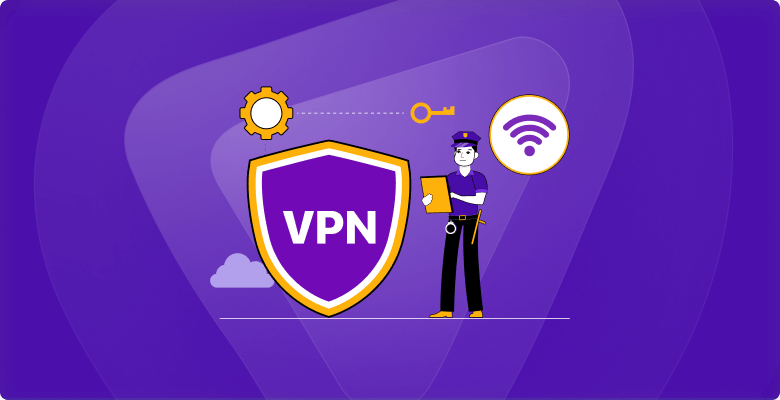Whether police can track VPN traffic is a common concern among users seeking online privacy. The truth is: the police can’t monitor encrypted VPN traffic. However, they can ask your Internet Service Provider (ISP) to provide connection or usage logs through a court order, which can lead them to your VPN provider.
Additionally, if there are vulnerabilities in VPN apps or software, the police and other third parties can exploit them to uncover your data transmissions. In this blog, we will delve a little deeper to find how police can track your VPN activity.
Can police track a VPN? Not really, but

The police can track your what you are doing with a VPN in two ways:
Approaching your ISP
One of the most common ways police can track VPN usage is through court orders. With a court order in hand, the police can approach ISPs to obtain connection or usage logs of specific individuals. Since your ISP is aware when you are using a VPN service, they can guide the police to them. Whether or not the VPN provider shares user information depends on factors such as the jurisdiction and the privacy policy of the VPN service.
Exploiting VPN vulnerabilities
Another way that police can track VPN usage is by exploiting vulnerabilities in VPN software or apps. If there are security weaknesses in the VPN software or app, it may be possible for the police and other third parties to intercept and monitor your online activities without your knowledge. Choosing a secure VPN provider and keeping software updated is crucial for mitigating these risks.
What information can the police obtain from your VPN provider?
Ultimately, It depends on your VPN service. Some VPNs keep logs of user activity, while others offer a strict no-log policy. Let’s explore what information the police can get from VPN providers in both scenarios:
VPNs that keep logs
When it comes to VPNs that keep logs, there are two main categories of data collection you need to know about: usage logs and connection logs. Usage logs typically include information about visited websites, providing details about users’ online activities and browsing history.
Connection logs encompass data like connection times, data usage, and the IP addresses associated with VPN connections. This can include both the users’ real IP address and the IP address assigned by the VPN server. If a VPN provider falls into this category, these logs could be shared with the police in response to a valid legal request.
No-Log VPNs
On the other hand, there are VPN providers that adhere to a strict no-logs policy. These providers do not collect or store any information about their users’ online activities. They retain minimal data, typically limited to what is necessary for billing and troubleshooting purposes.
With a no-log VPN, there is no meaningful data that the provider can provide to the police. These VPN providers also go through independent audits in most cases, adding an extra layer of credibility. As a result, users can have greater confidence in their privacy and anonymity when using a no-log VPN (PureVPN falls in this category).
Understanding the impact of data retention laws on VPNs
Data retention laws can have implications for VPN providers operating in countries with strict regulations. In such jurisdictions, VPN companies are legally required to keep logs, regardless of their claims of being “no-logs” on their websites..
For instance, if your VPN provider falls under the jurisdiction of the EU or US, they can’t guarantee a no-logs policy. While most premium VPNs do not actively monitor your browsing activity, they may retain details like connection logs, IP addresses, session information, etc.
PureVPN is legally registered in the British Virgin Islands, benefitting from a jurisdiction with no data retention laws. As such, we are not obliged to store users’ data, whether it be usage logs or connection logs. We prioritize user privacy and support an open internet, ensuring that our users do not feel monitored by their VPN provider.
Is using a VPN legal?
In countries with restrictions on VPN usage, accessing and using VPNs can be challenging or even impossible. In these regions, the ability to download and connect to a VPN may be restricted. However, there are solutions available, such as obfuscated servers, which act as an invisibility cloak for VPN traffic. They disguise VPN usage as regular internet traffic, providing a workaround in these restrictive environments.
While most countries allow VPN usage without issues, there are some governments that seek extensive control over their citizens’ lives. These governments may have measures in place to detect and restrict VPN usage. Here’s a list of countries where VPN use is either illegal or subject to restrictions:
- China
- Russia
- Iran
- United Arab Emirates (UAE)
- Turkey
- Belarus
- Iraq
- North Korea
Frequently asked questions
Can police track IP addresses?
Yes, police can track IP addresses. ISPs can associate an IP address with a subscriber’s information through records. With a court order, police can request the ISP to provide subscriber details. VPNs, on the other hand, mask IP addresses by routing traffic through servers. However, if a VPN keeps logs or is compelled to disclose user info, IP addresses can be traced.
Can a VPN be tracked?
While it is difficult to track VPN connections directly, it is possible for VPN usage to be tracked under certain circumstances. This can occur if a VPN keeps logs of user activity or if a government or authority forces the VPN provider to disclose user information. Hence, it is crucial to choose a reputable VPN service that has a strict no-logs policy and is located in a privacy-friendly jurisdiction for maximum protection.



